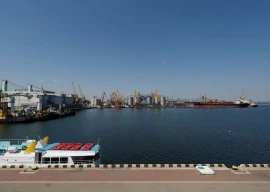
Exports of raw cotton more than doubled over the period from $886 million to $1.973 billion, however, exports of all other textile industries suffered, data released by the State Bank of Pakistan revealed.
Cumulative exports of cotton yarn, cotton cloth, knitwear, bed wear, towels and all other textile products fell by more than $74 million in July compared with June.
Experts commented that lack of electricity had wreaked havoc with the local textile industry. Industry stakeholders have also expressed fears that recent floods have caused significant damage to the cotton fields, limiting prospects of high production this year.
They say that imported cotton may be used to overcome the shortage, but this will hamper the competitiveness of local manufacturers.
Similar to textile exports, sale of Pakistani food items abroad also declined during July. Food exports stood at $275 million in July 2010, down $24 million from the previous month.
During this period, exports of basmati and other varieties of rice dropped to $184.8 million from $199.7 million in June. “These declines are certainly not presenting a pretty picture,” commented economist Asad Fareed, adding that “the true impact of the floods has not even been factored into exports as yet.”
Total exports from the country registered a decline of more than seven per cent in July when compared with the previous month, standing at $1.645 billion against $1.777 billion in June.
Food and textile exports constitute the biggest share in the country’s earnings through exports.
Food imports cancel out reduction in other imports
Palm oil imports shot up from $109.8 million in June to $147.3 million in July. Coupled with increases in demand for sugar and dry fruits, this rise took the value of food imports to $345.5 million in July from the preceding month’s tally of $313.4 million.
Experts say that food imports typically surge before Ramazan. However, they warn that recent floods have damaged rice, cotton and sugarcane crops, which may drive up the country’s reliance on imported food for the rest of the year.
Country’s imports stood at $2.914 billion in July compared with $3.064 billion during the preceding month.
Imports of petroleum products and furnace oil, the biggest contributors to the import bill, dropped to $970 million in July compared with $1.136 billion in June.
“The capacity of local refineries has improved gradually, bringing down the nation’s reliance on crude imports,” said InvestCap Research Head Khurram Schezad.
“Ample rainfall has also helped bring down demand for furnace oil for power generation,” he added.
Experts pointed out that local consumption of furnace oil had dropped by four per cent month-on-month in July. Schezad added “the continuing circular debt has also limited refineries’ ability to import crude oil, thus bringing down imports.”
Imports of miscellaneous products such as rubber tyres, wood, jute and paper also fell from $64.5 million in June to $54.7 million in July.
Published in The Express Tribune, August 20th, 2010.
1732762837-0/Taylor-(3)1732762837-0-405x300.webp)
















COMMENTS
Comments are moderated and generally will be posted if they are on-topic and not abusive.
For more information, please see our Comments FAQ